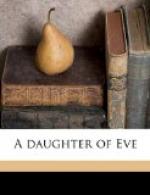“You are not very happy, my dear little girls,” he said one day; “but I shall marry you early. It will comfort me to have you leave home.”
“Papa,” said Eugenie, “we have decided to take the first man who offers.”
“Ah!” he cried, “that is the bitter fruit of such a system. They want to make saints, and they make—” he stopped without ending his sentence.
Often the two girls felt an infinite tenderness in their father’s “Adieu,” or in his eyes, when, by chance, he dined at home. They pitied that father so seldom seen, and love follows often upon pity.
This stern and rigid education was the cause of the marriages of the two sisters welded together by misfortune, as Rita-Christina by the hand of Nature. Many men, driven to marriage, prefer a girl taken from a convent, and saturated with piety, to a girl brought up to worldly ideas. There seems to be no middle course. A man must marry either an educated girl, who reads the newspapers and comments upon them, who waltzes with a dozen young men, goes to the theatre, devours novels, cares nothing for religion, and makes her own ethics, or an ignorant and innocent young girl, like either of the two Maries. Perhaps there may be as much danger with the one kind as with the other. Yet the vast majority of men who are not so old as Arnolphe, prefer a religious Agnes to a budding Celimene.
The two Maries, who were small and slender, had the same figure, the same foot, the same hand. Eugenie, the younger, was fair-haired, like her mother, Angelique was dark-haired, like the father. But they both had the same complexion,—a skin of the pearly whiteness which shows the richness and purity of the blood, where the color rises through a tissue like that of the jasmine, soft, smooth, and tender to the touch. Eugenie’s blue eyes and the brown eyes of Angelique had an expression of artless indifference, of ingenuous surprise, which was rendered by the vague manner with which the pupils floated on the fluid whiteness of the eyeball. They were both well-made; the rather thin shoulders would develop later. Their throats, long veiled, delighted the eye when their husbands requested them to wear low dresses to a ball, on which occasion they both felt a pleasing shame, which made them first blush behind closed doors, and afterwards, through a whole evening in company.
On the occasion when this scene opens, and the eldest, Angelique, was weeping, while the younger, Eugenie, was consoling her, their hands and arms were white as milk. Each had nursed a child,—one a boy, the other a daughter. Eugenie, as a girl, was thought very giddy by her mother, who had therefore treated her with especial watchfulness and severity. In the eyes of that much-feared mother, Angelique, noble and proud, appeared to have a soul so lofty that it would guard itself, whereas, the more lively Eugenie needed restraint. There are many charming beings misused by fate,—beings who ought




